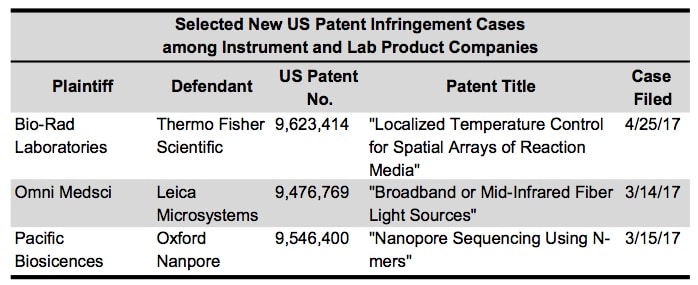Patent Litigation Review: NGS Settlements and New Suits
The first of IBO‘s biannual articles on patent litigation involving analytical instrument and lab product companies describes new suits regarding NGS, confocal microscopy and PCR, as well as new developments in suits involving Illumina and Thermo Fisher Scientific.
New Suits
After filing a 2016 US International Trade Commission case (see IBO 11/15/16) against Oxford Nanopore for infringement of US Patent No. 9,404,146 (“Compositions and Methods for Nucleic Acid Sequencing,”), Pacific Biosciences this year initiated a case in the US District Court. In March, Pacific Biosciences filed suit against Oxford Nanopore in the US federal courts’ US District Court for Delaware. The suit alleges infringement of a patent (see table below) by Oxford Nanopore’s MinION and PromethION nanopore sequencing systems. The patent was issued in January. Oxford Nanopore has not yet filed an answer to the complaint. On its website, Oxford Nanopore labeled the suit frivolous and “brought by a competitor nervous about our superior technology.”
Pacific Biosciences has also filed suit against Oxford Nanopore in the UK (see IBO 2/28/17) and Germany, according to Oxford Nanopore’s website, both concerning European Patent No. 1192453 (“Molecular and Atomic Scale Evaluation of Biopolymers”).
In suit a concerning confocal microscopy, Omni Medsci filed suit against Leica Microsystems, a Danaher company, in March in the US District Court for the Northern District of Illinois (see table). The suit alleges infringement by Leica Microsystems’ TCS SP5 X and SP8 X confocal microscopes. The complaint requests damages, pre-issuance damages, and preliminary and permanent injunctive relief. In May, Leica Microsystems answered the complaint, denying infringement and filed counterclaims seeking to dismiss the patent and stating that there is no basis to the suit.
In April, Bio-Rad Laboratories filed suit in the US District Court for the District of Delaware against Thermo Fisher Scientific, alleging infringement of a 2017-issued patent (see table below). The patent is related to the thermal block configuration of Bio-Rad’s PCR systems, according to the complaint. Specifically, the complaint cites “an apparatus for performing polymerase chain reactions in a plurality of samples.” The complaint alleges infringement by the VeriFlex blocks used in Thermo Fisher’s QuantStudio 3 and 5 real-time PCR Systems, ProFlex PCR system, Veriti thermal cycler and StepOnePlus PCR system. Bio-Rad is seeking compensatory damages. Thermo Fisher has not yet filed a reply.
Older Suits
In a suit filed in 2016 in US District Court for the Central District of Utah, BioFire Defense, a bioMerieux company and the University of Research Foundation alleged infringement of two PCR patents (see table) by Fluidigm. The complaint alleges direct, induced and contributory infringement. The plaintiff requests lost profits or a royalty as compensation.
Settlements
Another suit involving the same companies (see IBO 5/15/16) has been administratively closed as of April, pending a USPTO inter partes review initiated by Thermo Fisher in October 2016 seeking cancellation of certain patent claims.
Thermo Fisher is the plaintiff in a case filed in November 2016 that has since been dismissed. Thermo Fisher’s filed suit in the US District of Massachusetts against molecular spectroscopy maker DeNovix in November 2016. The complaint alleged infringement by DeNovix’s DS-11 spectrophotometers of two patents (US Patent Nos. 6,628,382 and 6,809,826 for “Liquid Photometer Using Surface Tension to Contain Sample”) covering Thermo Fisher’s NanoDrop micro-volume spectrophotometers. The case was dismissed in March, with the court stating the complaint was “deemed to be unserved.”
Two other cases also involve Thermo Fisher. Last month, Roche’s (454 Life Sciences) infringement suit against Thermo Fisher involving emulsion PCR (see IBO 7/15/15) was dismissed with prejudice at the request of both parties. The counterclaims brought by Thermo Fisher were dismissed without prejudice. A 2016 inter partes proceeding before the US Patent and Trademark Office regarding the validity of the patent claims under dispute was terminated in April, as the parties submitted a settlement and license agreement.
In April, plaintiffs Cornell University and Thermo Fisher (Applied Biosystems), and defendant Illumina jointly stipulated to the dismissal without prejudice of a 2010 patent infringement suit related to Illumina’s GoldenGate Genotyping Assay and DASL (cDNA-mediated Annealing, Selection, Extension and Ligation) Assay (see IBO 9/30/10). The trial was scheduled for this summer.
Updates
Claims of infringement of 1 of 6 patents under dispute in RainDance Technologies and the University of Chicago’s 2015 patent infringement suit against 10x Genomics (see IBO 4/30/15) have been dismissed. In March, the parties requested the dismissal with prejudice of the claims related to RainDance’s US Patent No. 8,658,430 (“Manipulating Droplet Size”). The patent was added to the case as part of an amended complaint.
In inter partes review brought by by 10x Genomics, the USPTO Patent Trial and Appeal Board concluded in January that claims 1–17 of the patent were unpatentable as obvious. However, RainDance also won a round at the USPTO. In November 2016, the USPTO found in a separate inter partes review of US Patent Number 8,889,093 (“Device and Method for Pressure-Driven Plug Transport and Reaction”) that 10x had not proved the selected claims were unpatentable.
US Patent No. 8,273,573 (”Method or Obtaining a Collection of Plugs Comprising Biological Molecules”) was removed from the amended complaint and removed from the US PTO inter partes review per the patent holder’s request.



